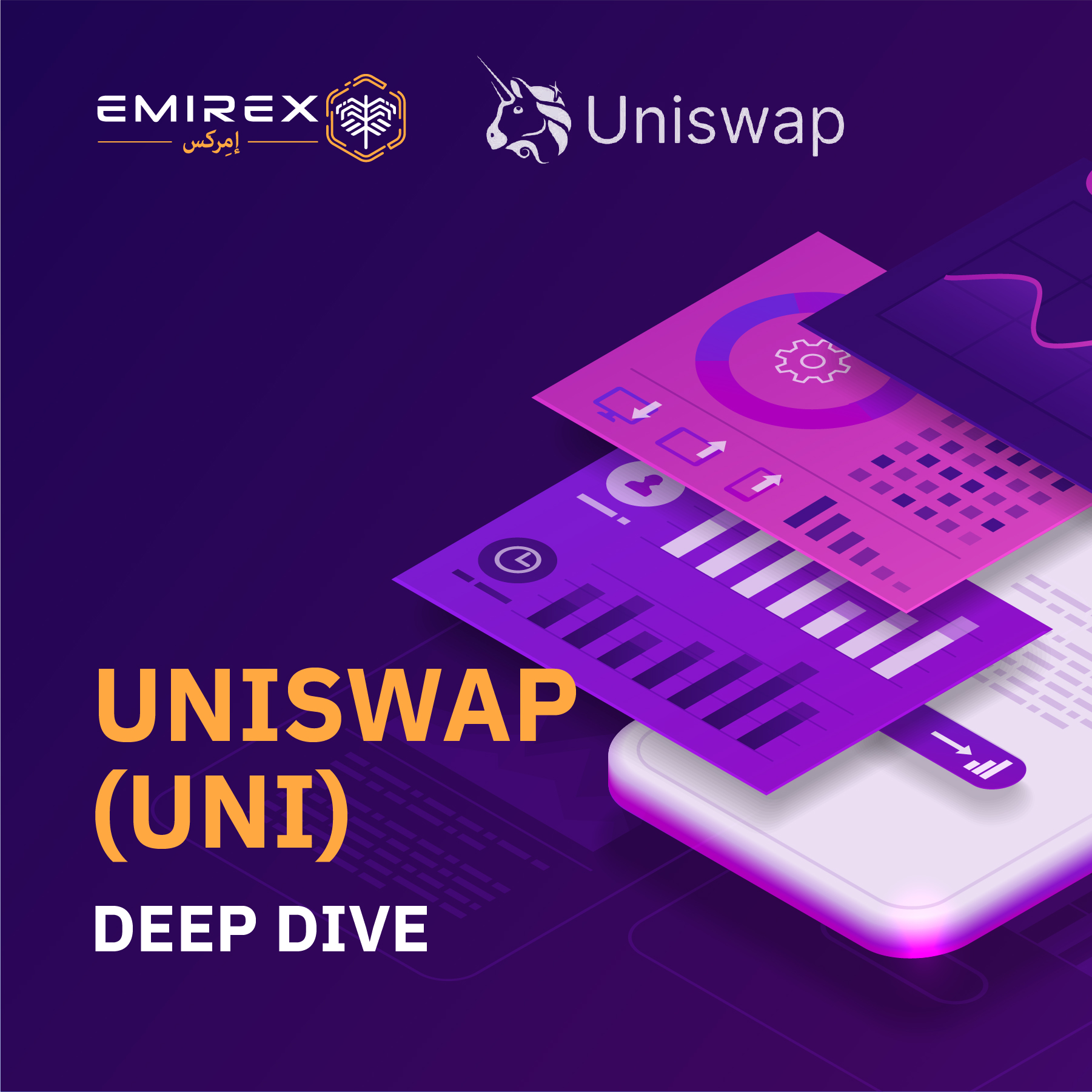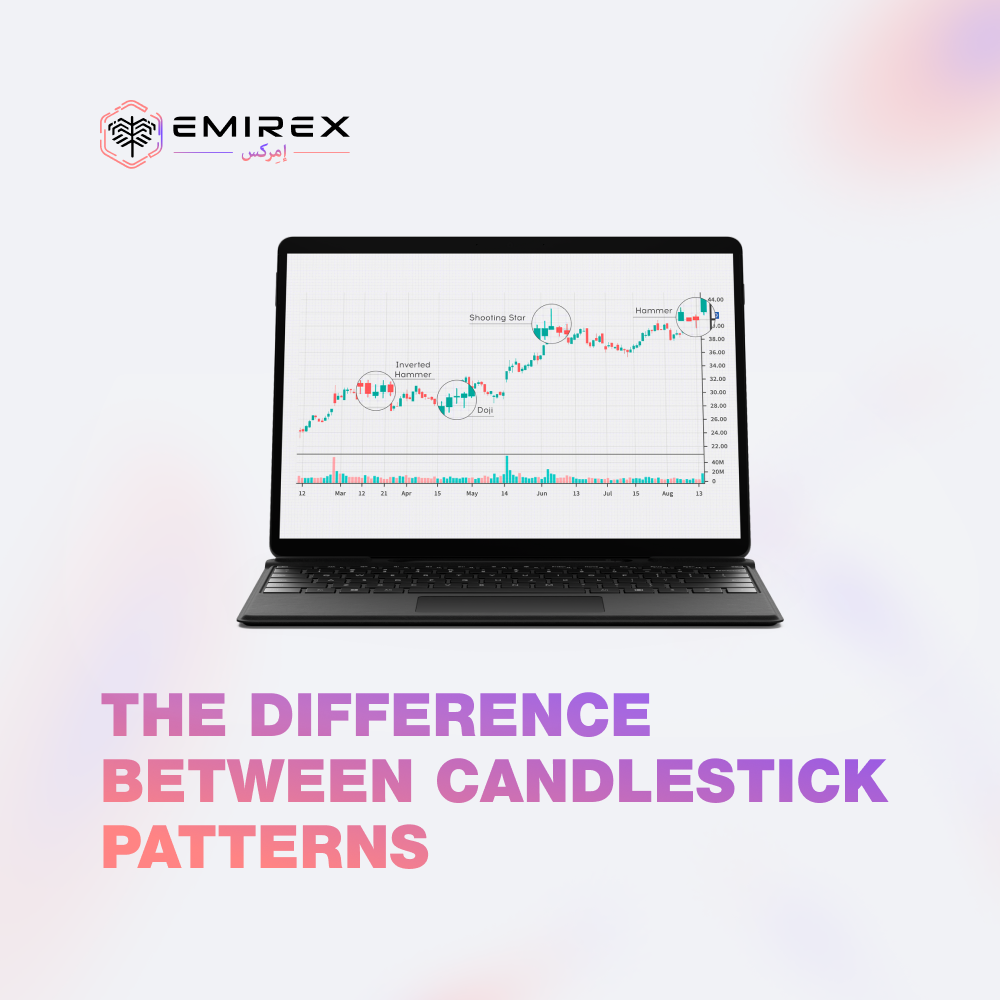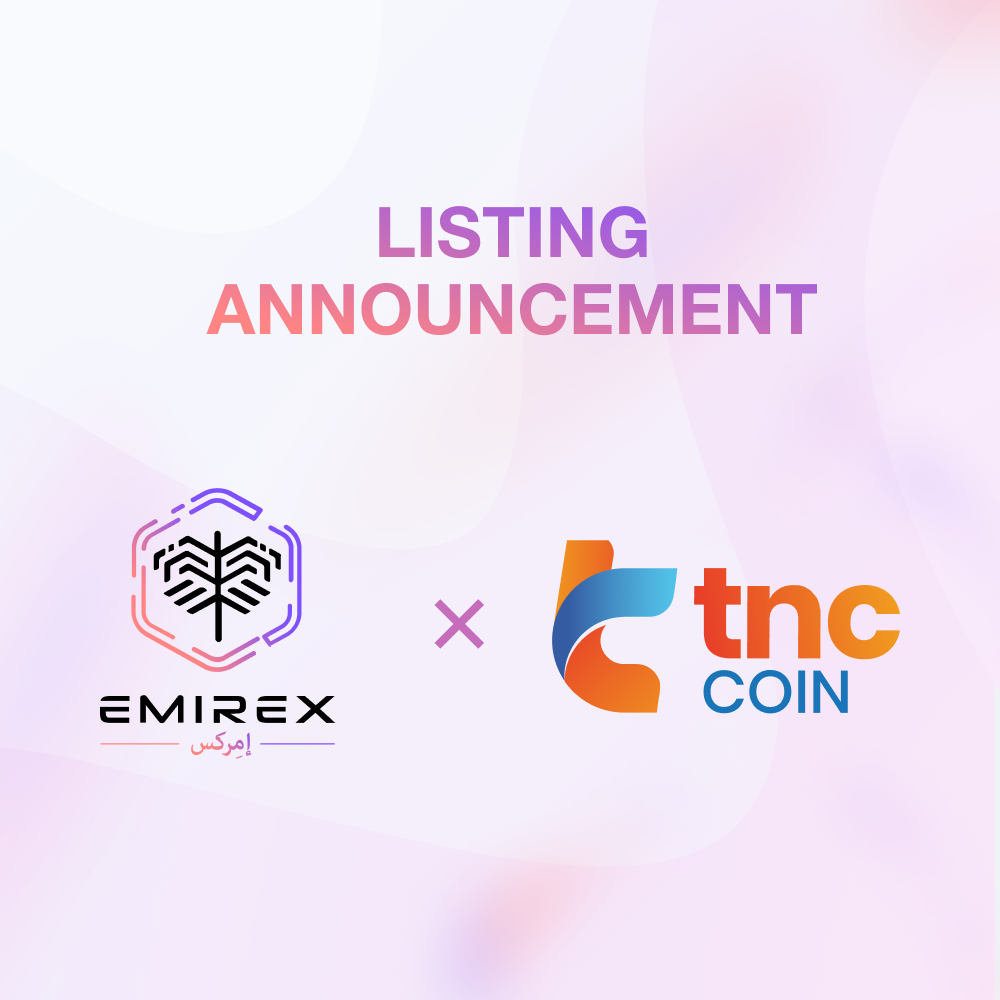Uniswap (UNI) is a decentralized protocol for automated liquidity provision. On 25th of September, Uniswap was listed for trading on the Emirex exchange.
Current available trading pair on the Emirex exchange: UNI/USDT, UNI/BTC
- Uniswap is an Ethereum based exchange that allows anyone to swap ERC20 tokens. Uniswap v1 was launched in November 2018, while the Uniswap v2 was launched in May 2020.
- UNI is an ERC-20 token on the Ethereum blockchain that offers control over the Uniswap protocol governance.
- Uniswap allows users to contribute to liquidity pools for any ERC 20 token and be rewarded in the form of exchange fees.
- Uniswap is built on a system called Automated Market Maker (AMM). At its core, liquidity is created by pools composed of two ERC-20 tokens.
CryptoCurrency Profile
- Token Standard - ERC-20
- Uniswap Price - $3,01 USD
- Uniswap ROI - 173,70%
- Market Rank - #35
- Market Cap - $558 513 071 USD
- 24 Hour Volume - $502 905 781 USD
- Circulating Supply - 185 611 368 UNI
- Total Supply - 1 000 000 000 UNI
- All Time High - $8,44 USD (Sep 18, 2020)
- All Time Low - $0,418998 USD (Sep 17, 2020)
About Project
Uniswap is a decentralized exchange that exists in the form of two smart contracts hosted on the Ethereum blockchain, and a public front-end open-source client. It is a 100% network market maker that allows users to exchange ERC-20 tokens for ETH, and vice versa. Uniswap also enables users to contribute to liquidity pools for any ERC-20 token and be rewarded in the form of exchange fees. Unlike most exchanges, which are designed to take fees, Uniswap is designed to function as a public good - a tool for the community trade tokens without platform fees or middlemen.
- The main exchange contract can work with any ERC 20 token.
- The “factory” smart contract contains an exchange register and a method for deploying an exchange contract for a specific asset.
Self-storage: Uniswap allows users a complete control over their funds. Thus, the risk associated with centralized exchanges, where one can lose his funds if the exchange gets hacked or goes bankrupt, is completely absent.
No KYC procedure: Since users have full control over their funds, there is no need to go through the KYC procedure and disclose personal information. In this way, it is much faster to start using the exchange.
Low fees: Uniswap charges a flat fee of 0.3% per trade. This is significantly cheaper than most decentralized exchanges.
Access to new coins: Typically, in the case of centralized exchanges, different cryptocurrencies or DeFi projects must go through an exchange verification process before their coin or token is available to traders. However, since Uniswap is decentralized and growing in popularity among the community, many companies choose to launch their projects directly on Uniswap. This way, Uniswap users can access new tokens before others.
Uniswap V1 vs Uniswap V2
The first version of Uniswap V1 implies that each liquidity pool works strictly in ETH pairs to one specific ERC20 token. The idea of the developers was that ETH is the most liquid token on the platform, besides, its code has been tested for a long time and there is no risk of hacking or theft of tokens. The disadvantage was that for the exchange between different ERC20 tokens, it was necessary to make 2 exchanges, which means that the user paid the commission twice.
To improve exchange efficiency and solve the problem of double commissions, Uniswap V2 was launched. It represents three ways of exchange:
- Direct exchange between ERC20 tokens.
- Traditional exchange via ETH, with double fees.
- Custom exchange directions, in which more complex exchange chains can be built.
UNI token
UNI is a native Uniswap ERC-20 token on the Ethereum blockchain that intends to initiate and incentivize community participation via “shared community ownership and a vibrant governance system”.
1 billion UNI tokens have been minted. This initial supply will be fully diluted over the four next years, with an allocation breakdown, as follows:
- 60.00% to Uniswap community members / 600,000,000 UNI.
- 21.51% to team members and future employees with 4-year vesting / 215,101,000 UNI.
- 17.80% to investors with 4-year vesting / 178,000,000 UNI.
- 0.069% to advisors with 4-year vesting / 6,899,000 UNI
As part of the launch of the UNI token, 60% of the UNI genesis supply has been allocated to community members. As of September 17th, 2020, ¼ of this supply (representing 15% of the total initial supply) was distributed to reward past Uniswap users, who can claim tokens directly on the governance portal.
The rest of the allocation will be offered through liquidity mining (“yield farming”) on four pre-selected pools: ETH/USDT, ETH/USDC, ETH/DAI, and ETH/WBTC. This liquidity mining will last for 3 months.
From 2024, the supply will grow at a 2% annual inflation rate.
Recent News
- 19 May 2020: Announced the Uniswap V2 mainnet launch;
- 06 Aug 2020: Announced the raise of $11M in Series A funding;
- 26 Aug 2020: Introduced token lists;
- 16 Sep 2020: Introduced UNI token;
Roadmap
The project has no official roadmap. The Uniswap Team will continue its path towards the decentralization of the platform. In the near future, we can expect the building Uniswap V3, which will dramatically increase the flexibility and capital efficiency of the protocol.
Perspective
Uniswap is the next step in the development of cryptocurrency exchanges. The platform works in a decentralized manner and at the same time perfectly fulfills its tasks. Its user base, against the backdrop of the boom in popularity of the decentralized finance niche, grew at least twice in August compared to the previous month, and the indicator does not plan to stop.
The exchange is doing an excellent job and works flawlessly. It is seriously consuming the resources of the Ethereum network, but this is the cost of the current market situation. However, the project is still under development, and only time will show how competitive it will become. But in general, the emergence of this type of trading platform is a positive trend.
Social Media
Website: https://uniswap.org/
Twitter: https://twitter.com/UniswapProtocol
Blog: https://uniswap.org/blog/uni/
GitHub: https://github.com/Uniswap
Explorer: https://etherscan.io/token/0x1f9840a85d5af5bf1d1762f925bdaddc4201f984






